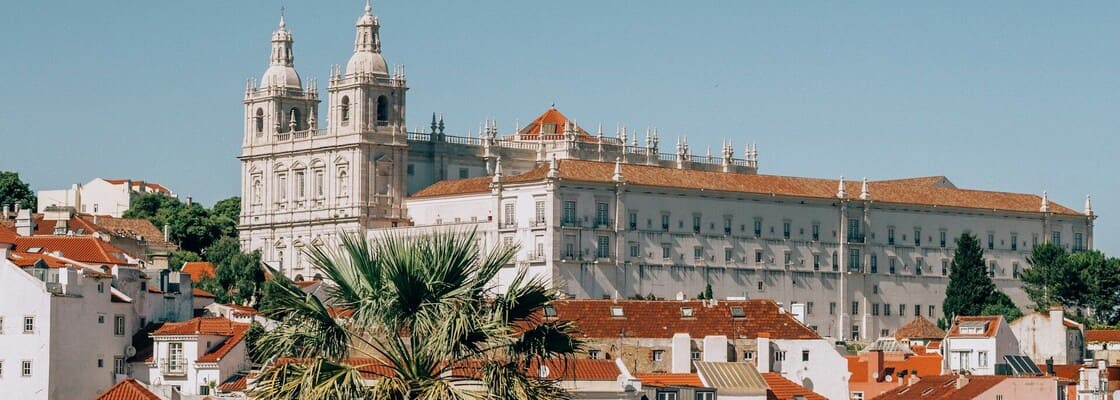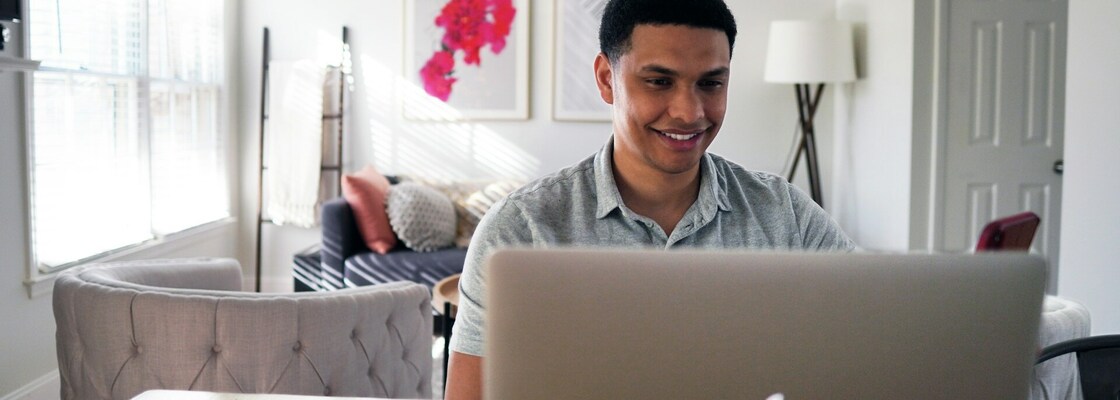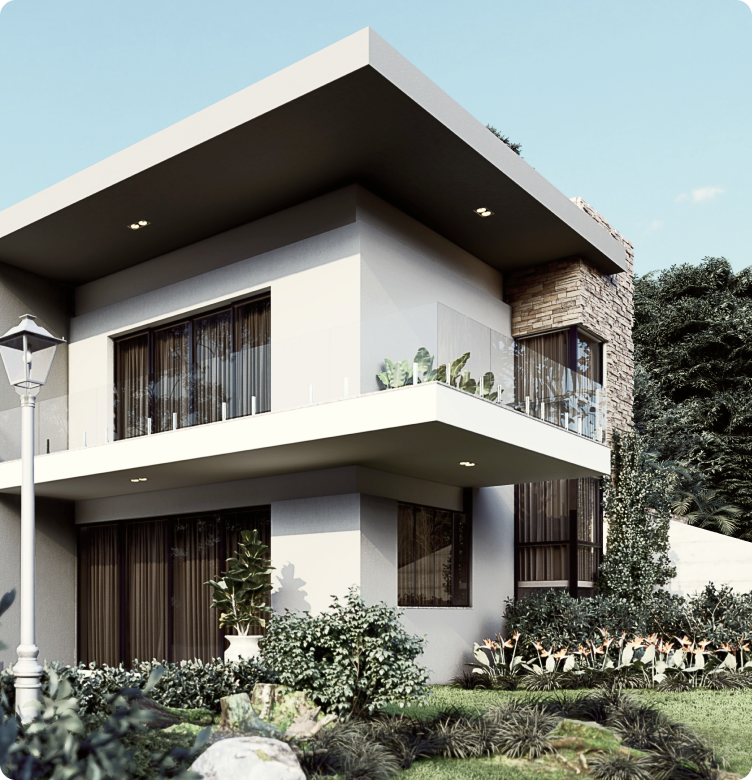Looking to invest in Portugal’s thriving real estate market? Whether you’re eyeing a picturesque villa in the Algarve or a chic apartment in Lisbon, applying for a mortgage in Portugal as an international investor can seem daunting.
However, acquiring a Portuguese mortgage loan is relatively straightforward for both residents and non-residents. In this comprehensive guide, we’ll walk you through everything you need to know about securing a mortgage for your dream property purchase in Portugal. From understanding the application process to deciphering mortgage agreements, we’ve got you covered.
We’ll delve into the intricacies of property and mortgage deeds, shed light on property purchase tax considerations, and provide invaluable insights into finding the right bank or independent mortgage broker to streamline your journey.
Key Reasons to Buy Property in Portugal

Due to its stable economy, affordable property prices, and high quality of life, the Portuguese property market has emerged as a prime investment hub over the past few years. The multifaceted allure of buying property in Portugal is a combination of promising returns on investment in a dynamic market and a cost of living that’s notably lower compared to other countries in Western Europe.
Portugal’s Mediterranean climate offers year-round appeal, complemented by top-tier education and healthcare systems. According to the 2024 Global Peace Index, Portugal is also the seventh safest country, adding to its appeal to tourists and expats. The country’s culinary delights and rich tapestry of cultural events add to its charm, and English is also widely spoken among Portuguese locals, making navigating your way through major cities and integrating into communities fairly easy.
In addition to all these clear benefits, foreign buyers also face no ownership restrictions, cementing Portugal’s status as an investor’s haven. In the sections below, we will explore more about the property prices in Portugal, and then delve into the types of mortgage loans you can apply for.
Property prices in Portugal
Property prices in Portugal offer a diverse range of options, making it an attractive destination for both investors and those seeking a holiday home. A recent housing market survey by Confidencial Imobiliario highlighted the resilience of Portugal’s real estate market in 2023. Despite a 20 percent decline in transactions in the past, in late 2023, the market rebounded with a 2.5 percent increase in quarterly sales since the second quarter of 2023.
In the Lisbon Metropolitan Area, the average asking price is relatively affordable compared to other European capitals, at €4,061 per square meter. The Porto and Algarve Metropolitan Area follow with average asking prices of €3,291 and €3,897, respectively, while the Alentejo region offers properties at €2,685 per square meter. More affordable options can be found in the north and center of Portugal, with average prices of €1,740 and €1,864, respectively.
Prices outside city centers and coastal areas are generally lower, making the market accessible to a wide range of buyers. However, it is important to remember that the purchase price for luxury property in the most desirable locations in Portugal will also be pricier and require a higher mortgage loan amount. You can also discover more in our 2024 Insights for Buying Property in Portugal article.
Can foreign investors get a mortgage in Portugal?
Foreign investors buying property in Portugal can obtain a mortgage. Whether they are permanent residents, expats, or investors from abroad, Portuguese banks offer mortgages to applicants with a strong credit score and history. Additionally, having a dependable income source, such as stable employment, passive investment income, or business ownership, significantly enhances the likelihood of securing a mortgage.
Types of Mortgages in Portugal

There are a few different mortgage loan types a Portuguese mortgage lender will offer. Before you sign the mortgage agreement, it is important to do your research, determine the loan amount you need, and compare Portugal mortgage rates.
Fixed-rate mortgage
Fixed-rate mortgages in Portugal allow property owners to pay a constant rate for a specified period, ranging from 3 to 30 years. Although these mortgages come with a significant premium, they protect borrowers from fluctuations in Euribor rates.
As of January 2024, fixed-rate mortgages are available at 3.5 percent (TAEG) for up to five years, with loan-to-value (LTV) ratios up to 70 percent. Non-fiscal residents face a regulatory LTV limit of 75 percent, though ratios can reach 90 percent.
Variable-rate mortgage
Variable-rate mortgages in Portugal are influenced by the mortgage spread, which is a fixed interest percentage set by the bank, currently around 0.85 percent for most institutions. For non-residents, these mortgages typically cover up to 70 percent of the property value, so borrowers should be prepared to cover the remaining 30 percent, plus taxes and fees. Monthly payments fluctuate based on the Euribor index and are revised every three, six, or twelve months. Early repayment incurs a 0.5 percent charge on the repaid capital.
Mortgages for businesses
In Portugal, businesses can obtain mortgages by demonstrating consistent company profit with their business bank statements. Banks assess the financial health of the business to ensure its profitability. The maximum lending age for non-residents is 75 years, with a maximum mortgage period of 360 months.
Life insurance is typically required to take out a loan, which can be challenging to secure for individuals over 60. This standard applies similarly to retirees who need a regular pension income to qualify for a mortgage, with age limits extending to 80 in some cases.
Mortgages for retirees
Retirees in Portugal can obtain mortgages if they have regular pension income. Lending criteria for mortgages in Portugal typically include a maximum mortgage of 50 percent of the purchase price for commercial properties or lower if the valuation report dictates. This ensures financial stability and manageable repayments for retirees.
How do mortgages work in Portugal?

The mortgage application process begins with an initial approach to the bank or mortgage broker. Having an experienced mortgage expert on your side will make securing the best deal for your situation much simpler. A no-obligation estimate, or initial assessment follows. The following six-step process then begins and includes the steps of getting a quote for your estimated monthly mortgage repayment to signing the property deeds and mortgage deeds:
- Mortgage quote
- Application forms delivery
- Formal mortgage offer
- Valuation report
- Completion arrangements
- Payment (all the associated mortgage-related fees, minimum deposit, tax office fees, and taxes) and signing (property deeds and mortgage deeds)
Qualifying mortgage requirements in Portugal
Eligibility for a mortgage in Portugal requires a solid credit history, stable income, and manageable monthly payments. Portuguese banks and mortgage lenders assess financial standings, including gross annual salary, debt-to-income ratio, employment history, and property valuation, as part of their lending criteria.
Documents required to apply for a mortgage in Portugal
Regardless of employment status, employed applicants, self-employed applicants, and applicants in other income circumstances will need to have the documents listed below to apply for a mortgage in Portugal.
You will also be required to show additional documents not listed below that pertain to your unique employment and income status. If you are a retiree, you must be able to prove a regular pension income. Please note that the bank may request more documents in addition to proof of your pension income.
- Copy of passport
- Portuguese tax resident number (NIF number)
- Proof of income
- Bank statements
- Recent utility bills
- Recent mortgage statements
- Proof of any savings or investment accounts
- Bank account reference letters
- Property details – buying commitment or sales contract
Mortgage rates for foreigners in Portugal
International buyers generally pay the same interest rates on mortgages in Portugal as Portuguese citizens and residents do. However, foreign investors might face higher mortgage rates due to perceived risk. Competitive rates are available from select lenders.
Choosing the right Portuguese bank for a mortgage in Portugal
To secure the best mortgage rate in Portugal, it’s essential to compare offerings from various lenders, including BBVA, Santander, Banco Best, Bankinter, and Banco CTT. Mortgages commonly span 30 years, but flexible terms are available.
Foreigners typically need a down payment of at least 30 percent, though some lenders may require up to 50 percent. The minimum age to apply is 18, with no official upper age limit; however, borrowers over 70 may face challenges due to the typical 25 to 30-year mortgage terms for non-residents.
Retirees with a regular pension income can also get a mortgage in Portugal. The maximum lending age in Portugal for a non-resident is restricted to 75 years of age, with a period of 360 months. If you are over 60 years old and are looking into getting life insurance in Portugal (as it is a standard loan requirement), although possible, it can be very difficult.
Exploring the Minimum Deposit and Loan-to-Value Ratio

The cost of the mortgage loan depends on your financial status. Portuguese mortgage lenders will measure your ability to maintain the loan. The spread or interest loans that the bank charges are a measure of the bank’s valuation of risk.
In Portugal, the interest rate charged is generally Euribor, plus the spread. This adds to the spread charged by the banks, which is usually three to five percent. Mortgage agents will often approach various banks in Portugal to secure the most competitive rates for you.
What is the Loan-to-Value Ratio in Portugal?
It shows the percentage ratio of your property’s value to the size of your loan. Most banks in Portugal offer mortgages with a Loan-to-Value ratio (LTV) of 60 to 70 percent.
What is the minimum deposit required for a mortgage in Portugal?
The minimum deposit required for a mortgage in Portugal for non-residents is usually about 30 percent of the purchase price. Financing institutions typically provide between 60 and 70 percent of the property’s valuation price for non-residents.
Additional costs and fees when applying for a mortgage in Portugal
When applying for a mortgage in Portugal, there are various additional costs and fees to consider beyond the down payment and property purchase price. These additional costs and fees include fixed fees like the €290 application fee and the €280 bank valuation fee.
Stamp Duty Tax, which is 0.6 percent of the mortgage loan, is part of the financial application considerations. Other charges, such as the €500 to €1000 for notary, registry, and tax office fees related to mortgage deeds, should also be considered.
Beyond these are numerous other expenses, such as property registration, mortgage arrangement, administration fees, legal charges, and taxes like Stamp Duty, Property Transfer Tax, and Municipal Property Tax, which you will need to budget for when buying property.
Using a mortgage calculator in Portugal
A mortgage lender, such as a bank or credit union, usually has their own mortgage calculator on their websites, which calculates the estimate for monthly repayments on mortgage rates in Portugal. The factors involved in calculating this estimate include:
- Your credit score: Of course, a good credit score will result in a favorable rate.
- Debt to income ratio: Your monthly debt payments divided by your gross monthly income
- Loan to value (LTV) ratio: The ratio of the loan amount to the property value
- Property value amortization schedule: A breakdown of your mortgage repayments over time, including the interest rate
- Insurance: The property insurance and life insurance requirements for getting a mortgage
- Early repayment charges: If you pay off your mortgage early, you will be charged a fee, typically 0.5 percent of the property value.
Find Your Dream Property with BE Global
BE Global Properties is the discerning property investors’ gateway to meticulously curated properties that transcend ordinary listings. Look no further when searching for your next dream home or investment property in the luxury real estate market.
Explore our exclusive listings and work with our experts who offer market insights for smart investment choices and exceptional customer service to find the property investment perfectly tailored for your lifestyle ultimately.
Contact BE Global Properties today and start your journey to find your global haven.
Frequently Asked Questions About Getting a Mortgage in Portugal
Can a foreigner get a mortgage in Portugal?
Since 2017, foreigners can secure mortgages in Portugal, typically up to 70 percent of the property’s sale price. Applicants are generally accepted up to age 65, with some banks extending 80. Portugal actively encourages and simplifies the mortgage process for foreigners.
What is the maximum loan-to-value for Portuguese mortgages?
The maximum loan-to-value (LTV) ratio for Portuguese mortgages typically ranges from 60 to 70 percent. This ratio represents the percentage ratio of the property’s value to the size of the loan offered by most banks in Portugal.
How much can I borrow for a mortgage in Portugal?
For non-residents in Portugal, the maximum loan-to-value (LTV) ratio for mortgages typically ranges from 60 to 70 percent of the property’s purchase price. This indicates the amount that can be borrowed against the property’s value.
What are the lending criteria for a mortgage in Portugal?
To qualify for a mortgage in Portugal, individuals need a strong credit history, steady income, and affordable monthly payments. Lenders evaluate factors such as gross annual salary, debt-to-income ratio, employment background, and property valuation to determine eligibility.
Should I buy property in Portugal?
Portugal is a smart investment choice for property investors, given its stable economy, reasonable property prices, and exceptional quality of life. With promising returns and a lower cost of living compared to many other countries in Western Europe, Portugal presents investors with an exciting opportunity.
What are the benefits of taking out a Portuguese mortgage for foreigners?
Foreigners considering a Portuguese mortgage benefit from legal property checks and valuations arranged by lenders. This can facilitate real estate investments, with rental income in euros potentially offsetting mortgage payments, reducing currency risk. Additionally, Portuguese mortgages offer low rates, accessibility for non-residents, rental flexibility, and generally low installment rates.
What is the age limit to take out a mortgage?
Applicants are generally accepted up to age 65, with some banks extending to age 80.
Can retirees take out a mortgage in Portugal?
Retirees in Portugal can secure mortgages with regular pension income. Typically, lending criteria cap mortgages at 50 percent of the property’s purchase price for commercial properties, ensuring financial stability and manageable repayments for retirees.
Is it difficult to get a mortgage in Portugal?
Obtaining a mortgage in Portugal is generally straightforward for both residents and non-residents. With guidance from a local real estate lawyer and selecting the appropriate bank or mortgage broker, the process becomes manageable.
What are the mortgages available in Portugal for non-residents?
For non-residents seeking mortgages in Portugal, options include fixed-rate and variable-rate mortgages. Fixed-rate mortgages offer stability, with rates ranging from 3.5 percent for five years with LTV ratios up to 70 percent. Variable-rate mortgages, influenced by Euribor, cover up to 70 percent of property value.
Can I get a mortgage in Portugal as a UK resident?
Yes, you can. Portugal actively encourages and simplifies the mortgage process for foreigners. Applicants are generally accepted up to age 65, with some banks extending to age 80.
How much deposit do you need for a mortgage in Portugal?
For a mortgage in Portugal, the deposit varies by residency status. Non-residents usually require a deposit of at least 30 percent of the property’s purchase price. Lenders typically provide between 60 and 70 percent of the valuation price for non-residents.
Can I get a 100 percent mortgage in Portugal?
In Portugal, securing a 100 percent mortgage is unlikely for non-residents. Mortgage lenders typically cover only between 60 and 70 percent of the property’s purchase price for expatriates, leaving the remainder to be financed independently.
What is the difference between a variable-rate and fixed-rate mortgage in Portugal?
In Portugal, the difference between a fixed-rate and a variable-rate mortgage primarily lies in the stability and predictability of interest rates. Fixed-rate mortgages in Portugal allow property owners to pay a constant rate for a specified period, ranging from 3 to 30 years. These mortgages come with a significant premium but protect borrowers from fluctuations in Euribor rates.
On the other hand, variable-rate mortgages are influenced by the mortgage spread, a fixed interest percentage set by the bank, currently around 0.85 percent for most institutions. Monthly payments for variable-rate mortgages fluctuate based on the Euribor index and are revised every three, six, or twelve months. Non-residents should note that these mortgages typically cover up to 70 percent of the property value, requiring borrowers to cover the remaining 30 percent, plus taxes and fees.
What is the average interest rate for mortgages in Portugal in 2024?
According to CEIC, the average interest rate for mortgages in Portugal in 2024 is reported at 3.19 percent per annum as of June 2024, compared to 3.16 percent in the previous month and 3.09 percent last year. This rate is lower than the long-term average of 4.88 percent. The data is updated monthly and available from July 1993 to June 2024.
What are the requirements for getting a mortgage in Portugal as a foreigner?
To get a mortgage in Portugal as a foreigner, financial institutions require a solid credit history, stable income, and manageable monthly payments. Portuguese banks assess eligibility based on financial standings, including gross annual salary, debt-to-income ratio, employment history, and property valuation, as part of their lending criteria. You will also be required to provide the following documents:
- Copy of passport
- Portuguese tax resident number (NIF number)
- Proof of income
- Bank statements
- Recent utility bills
- Recent mortgage statements
- Proof of any savings or investment accounts
- Bank account reference letters
- Property details – buying commitment or sales contract
How does the mortgage process work in Portugal?
The mortgage application process begins with an initial approach to the bank or mortgage broker. A no-obligation estimate or initial assessment follows. The following six-step process then begins and includes the steps of getting a quote for your estimated monthly mortgage repayment to signing the property deeds and mortgage deeds:
- Mortgage quote
- Application forms delivery
- Formal mortgage offer
- Valuation report
- Completion arrangements
- Payment (all the associated mortgage-related fees, minimum deposit, tax office fees, and taxes) and signing (property deeds and mortgage deeds)
How long does it take to get mortgage approval in Portugal?
In Portugal, it typically takes one to six months to buy a property, including sorting out paperwork and signing the promissory contract. Once all necessary documents for the mortgage application have been submitted, it can take anywhere from a few days to six months to get approval for a mortgage loan, especially in cases where mortgage approval delays are at play.
How do I choose the right mortgage provider in Portugal?
To choose the right mortgage provider in Portugal, compare offerings from lenders like BBVA, Santander, Banco Best, Bankinter, and Banco CTT. Mortgages typically span 30 years with flexible terms. Foreigners need a down payment of at least 30 percent. Retirees with regular pension income can also secure mortgages.
How do early repayment penalties work in Portugal?
If you pay off your mortgage early, you will be charged a fee that typically amounts to 0.5 percent of the property value.



